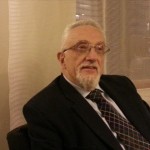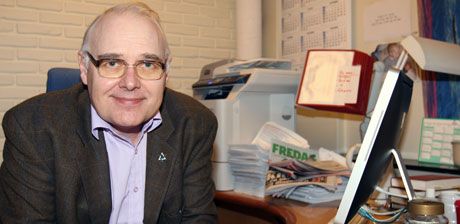This interview by Dr.Gerstenfeld was published at Israel National News, and republished here with the author’s consent.
Like in Finland, the rank and file of actual participants in these churches do not have their views supported nor represented by the upper echelon. They remain very pro-Israel. The leadership however, has been subverted by the Palestinianization/Islamization movements within the EU and UN.
CHRISTIAN FOES AND FRIENDS OF ISRAEL IN NORWAY
Manfred Gerstenfeld interviews Odd Svere Hove
 “In the 1970s, the previous generation of bishops took a strong stand against anti-Semitism. They also admitted that the church defense for Norwegian Jews in 1942 – popularly called the ‘Letter on the Hebrews’ – came too late to prevent their deportation to Nazi death camps.
“In the 1970s, the previous generation of bishops took a strong stand against anti-Semitism. They also admitted that the church defense for Norwegian Jews in 1942 – popularly called the ‘Letter on the Hebrews’ – came too late to prevent their deportation to Nazi death camps.
“The present generation of Lutheran bishops in Norway is dominated by pro-Palestinian liberation theology, as well as replacement theology. The latter claims that God’s Covenant with the Jews has been ‘replaced’ by one with Christians. Oslo’s Bishop Ole Christian Kvarme lived in Israel for several years and speaks excellent Hebrew. His impact was crippled by a hostile campaign waged by the media and leftists before his consecration into the bishop’s seat. Kvarme is a friend of Israel, but knows how harsh media criticism will be if he states it too loudly in public.”
Odd Sverre Hove was Editor-in-Chief of the Norwegian Christian daily Dagen. He was former Rural Dean in the Church of Norway and Secretary-General of the Norwegian Fishermen’s Mission.
“A re-orientation in 1675 created a lasting division between Lutheran theologians over the years. Most of the establishment ones stuck with replacement theology. The more independent theologians loved the Biblical promises of a Jewish return to the Promised Land. This division exists until today.
“The Church of Norway was a state church since Medieval times. After the Lutheran Reformation of the 16th century, the church was governed even more strongly by the King. The 2011 change in the Constitution ended the state status of the Church of Norway. Its bishops and deans are no longer appointed by the Norwegian government. Final decades of the state church system were marked by a strongly growing social-democratic ideological hegemony on the church, which fought against unpopular Biblical truths.
“One should not overestimate the church’s current freedom. It is still subject to political pressure as its budgets continue to be decided upon by the Stortinget (Parliament) and Local Municipal Councils. Each year a similar amount of money per member is transferred to non-state-church religious communities to avoid financial discrimination.
“Membership in the Church of Norway is around 77% of the population, while forty years ago it was around 96%. This decrease is partly due to a growing transition to Protestant Free Churches and the Catholic Church, people becoming irreligious and the immigration of Catholics, Muslims, Hindus and so on. Church attendance is unusually low compared to the results of personal faith surveys.
“In the 1980s, the government and Storting allowed the establishment of a yearly Church Synod (Kirkemøte). It consists of about 80 elected representatives and some 15 unelected members, among whom are 12 bishops. A Synod Council (Kirkerådet) was also established of about 15 members.
“The Ecumenical Council (MKR, Mellomkirkelig Råd) of the Church Synod is a strong advocate of Palestinian theology, maintaining connections to The World Council of Churches in Geneva. The presently elected Church Synod, together with the Synod Council, is often more moderate in questions concerning ‘political’ theology. In September 2013, the MKR sent a liturgical text on Palestinian occupation theology to all local churches to be used for one week on a voluntary basis. The MKR was subsequently criticized by Kirkerådet, which argued against political statements within church liturgy.
“The main body of Norwegian Christian supporters of Israel can be found in various churches, in prayer houses, as well as among most members of Free Protestant churches. There are a number of pro-Israel organizations. The main and most efficient one is the non-religious MIFF (Med Israel for Fred). Membership in this pro-Israel advocacy body is growing rapidly. Most members are Christians and Jews. It has thriving activities in Oslo and regional cities all over Norway.
“Most pro-Israel movements have meetings, large summer conferences, distribute membership leaflets and occasionally make public statements. Their members occasionally participate in public pro-Israel demonstrations in Oslo whenever something special is going on.
“Pro-Israel groups are mostly ignored, or occasionally attacked by Laborites and other leftists in the media. Exceptions include the small Christian daily Dagen and the weekly Norge Idag, which has its own book company. Vårt Land is a somewhat balanced Oslo-published paper with a more church establishment leaning. It is usually amenable to pro-Israel op-eds. The influence of these groups upon the general public is modest however, as the country is dominated by a monolithic leftist ideological hegemony having little tolerance. Hopefully, the new Norwegian government consisting of Conservatives and Progressives will not be hostile to Israel the way its Labor-dominated predecessor was.”

